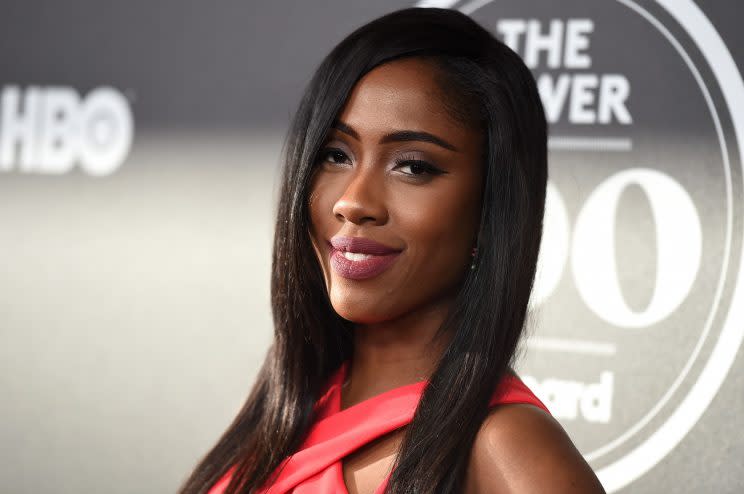76ers stop singer from performing national anthem for 'We Matter' jersey

The NBA’s much-anticipated continuation of the NFL’s national anthem protests have so far been pretty tame. Players and teams have opted to stand with arms locked in vague displays of unity, preferring instead to “focus on solutions” instead of gestures. The shape of discourse has frankly been a little disappointing — there seems to be no sense that protest can be form of action, and many of the proposed solutions to police killings of unarmed minorities rely on false equivalencies and changing the subject. In fact, the most powerful demonstrations so far have come not from the players on the court, but two national anthem singers while performing at preseason games in October.
Philadelphia 76ers officials apparently wanted to avoid even the mild controversy drummed up by those incidents at their season opener against the Oklahoma City Thunder on Wednesday night. Recording artist Sevyn Streeter was set to perform the national anthem, but she never made it out onto the court once the powers that be saw her “We Matter” t-shirt. She and her makeup artist Tatiana Ward explained what happened in several posts to social media (via PBT and Billy Penn):
Was suppose to sing the anthem at @sixers & @okcthunder game but mins b4 @sixers said I couldn't because I was wearing a "We Matter" jersey pic.twitter.com/wjoJN3rq0r
— Sevyn (@sevyn) October 27, 2016
A video posted by Tatiana Ward (@beatfacehoney) on Oct 26, 2016 at 5:46pm PDT
Streeter added to her story in an interview with the Associated Press:
“I’d say two minutes before we were about to walk out … the organization told me that I could not wear my shirt while singing the national anthem at their game,” the R&B singer said by phone. “I was never given any kind of dress code. I was never asked beforehand to show my wardrobe.”
A 76ers dancer identified only as Jemila took Streeter’s place during the anthem. Streeter was also set to perform at halftime with rapper Desiigner, but he instead went onto the court solo. As noted by The Vertical’s Michael Lee, Desiigner was booed off the court for unrelated reasons.
The Sixers have not denied what took place. They issued this statement as explanation (via Dan Feldman):
“The Philadelphia 76ers organization encourages meaningful actions to drive social change. We use our games to bring people together, to build trust and to strengthen our communities. As we move from symbolic gestures to action, we will continue to leverage our platform to positively impact our community.”
The Sixers obviously took exception to Streeter’s jersey, which replaces the more direct “Black Lives Matter” with the more general “We.” But Streeter’s message was clear, and the team’s response was to silence her voice.
The franchise did not take a principled stand for unity. “We Matter” is a divisive statement, but only in the sense that it calls attention to ongoing mistreatment of a long-disadvantaged minority group that has to deal with cultural divisions on a daily basis. Philadelphia has a long, painful history of racism that has involved de facto segregation to this day. Barring Streeter from making a prevalent and relatively mild political statement does not build trust and strengthen the community — it only serves to solidify the culture of prejudice that already exists. It’s a decision made to comfort fans who don’t want to engage with very real problems.
Moments like this one clarify why the Sixers’ and NBA’s willful separation of protest and meaningful action has to go. The league’s language surrounding Colin Kaepernick’s NFL protests suggests that his actions have laid important ground work for substantive change to come. Yet that foundation does not disappear the minute NBA players start holding town halls and working directly with communities (which, it should be noted, Kaepernick does quite a bit). Plenty of Americans are still unaware or unwilling to listen to the experiences of minorities with the police and other unfeeling institutions. If we have truly taken Kaepernick’s message to heart, then a national anthem singer’s reference to it should not be deemed offensive. It should be an accepted part of the process.
As Dave Zirin wrote for The Nation in September, it feels as if the NBA is only interested in dealing with these racial issues if it can avoid any controversy at the same time. That doesn’t mean everything they have done is bad — players have gotten involve with lots of worthwhile social programs they might not have worked on otherwise, and linking arms on the court is nice to see even if it feels a little toothless. Unfortunately, acting as if protest is now unnecessary gives team officials cover to discriminate against viewpoints they find uncomfortable. More actions like this one are only more likely to inspire the stronger demonstrations the NBA has asked players not to make.
– – – – – – –
Eric Freeman is a writer for Ball Don’t Lie on Yahoo Sports. Have a tip? Email him at efreeman_ysports@yahoo.com or follow him on Twitter!

 Yahoo Nachrichten
Yahoo Nachrichten 


